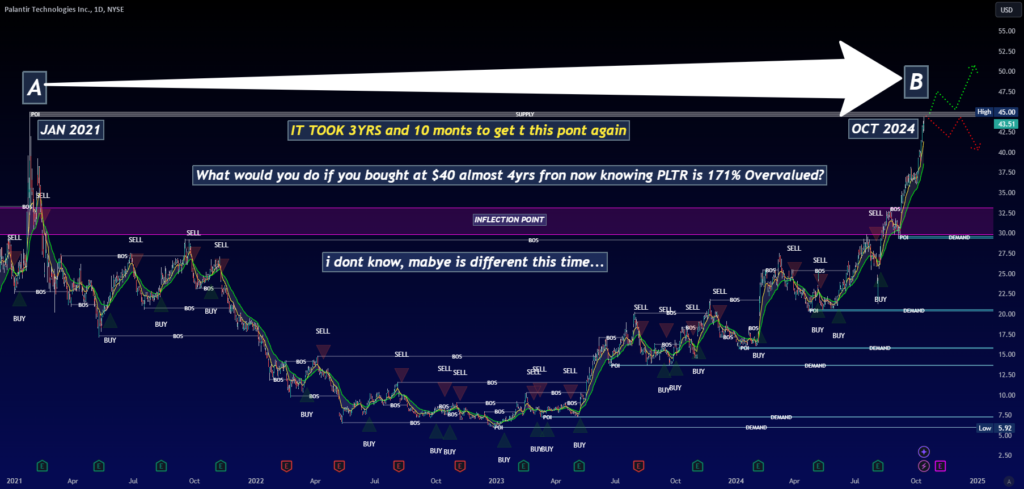
Let’s welcome Palantir (PLTR) into the weekend analysis!
As we can see in the chart, today I wanted to do general structure analysis not too specific, as we are practically touching the highest level again in nearly 4 years.
Congratulations to all who bought at $12–16 per share and are still holding Palantir, but as I show in the chart, from point A to point B, it took almost 4 years to reach these levels again.
But here’s my question: WHAT WOULD YOU DO IF YOU BOUGHT AROUND $40 IN 2021?
I’d love to know, as this situation can greatly influence each person’s psychology when making a fundamental decision in trading.
(LEAVE YOUR OPINION IN THE COMMENTS)
I want you to know that I don’t just focus on price analysis. I also study company valuation. Based on a fundamental analysis of its balance sheet and recent moves by PLTR, I’ve concluded that Palantir is currently 171% above its intrinsic value.
In my personal opinion, my decision leans more toward common sense…
What do I mean?
1. Palantir is 171% overvalued.
2. Palantir is diluting its investors like crazy! In every quarterly report.
Do you know what dilution is?
Stock dilution can be harmful to shareholders because the value of each share is reduced, even though the investor holds the same number of shares. This is because the total value of the company doesn’t increase proportionally with the number of shares.
Palantir is an excellent company, although it’s a bit complicated to understand what they do and how they make money. But in my personal opinion, a company that dilutes its investors is nothing but a red flag to me—and a big red flag—because I call this the silent killer for investors.
At this point, PLTR is more on the hype side!
If Palantir reports well in November, we could see the stock above $50 per share, BUT if Palantir reports anything that doesn’t meet investor expectations, any data that falls short… Buckle up!
But how much could it fall? The truth is, I don’t know. But if we base it on technical analysis, I have an important inflection point (purple zone) where I expect the price to bounce after a sharp drop. BUT CAUTION! Only if Palantir doesn’t meet expectations.
An inflection point in trading refers to a critical moment on a price chart where the trend or price direction is expected to change. It marks the transition from one phase of price movement to another, often signaling a turning point in market sentiment or momentum. Traders pay close attention to inflection points as they may indicate a radical trend shift.
Traders use these points to adjust their strategies, such as entering or exiting positions, to capitalize on the expected change in price direction.
BUT WHAT WILL REALLY HAPPEN? I don’t know, maybe this time it will be different—who knows? But the only thing I can tell you is that numbers don’t lie, and neither does price action.
So, I hope the decision you make is the right one!
Thank you for supporting this analysis.
Sending you my best regards!


